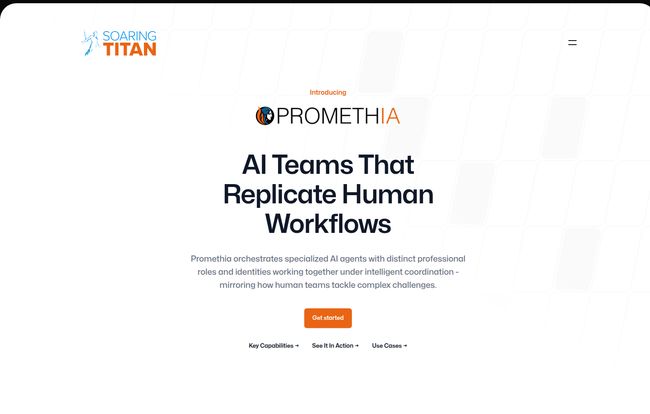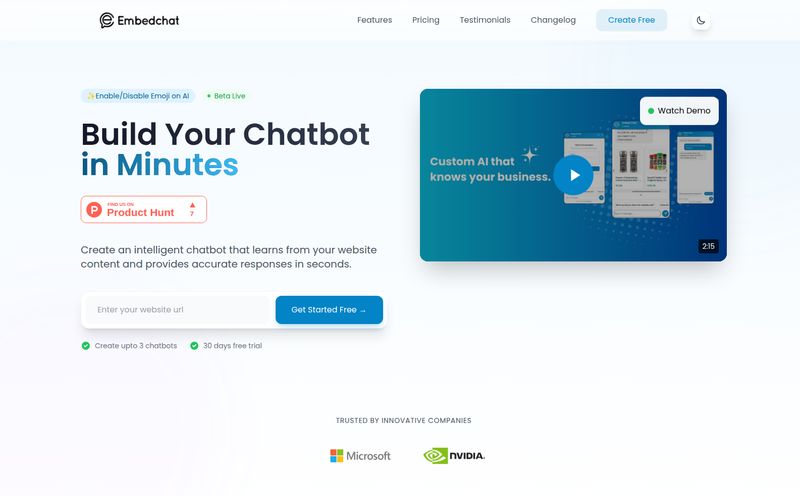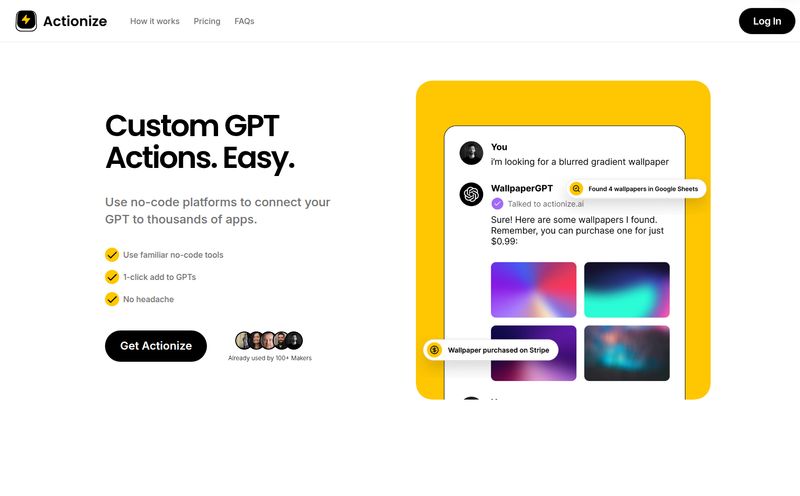I’ve been in the SEO and digital strategy game for a long time. Long enough to remember when “AI” was just a fancy term for a slightly-too-aggressive keyword stuffing tool. Now, it’s everywhere. We have AI that writes, AI that designs, and AI that codes. But honestly? Most of it still feels like you’re working with a super-smart, but very single-minded, intern.
You give it a task, it goes off and does it. Sometimes brilliantly, other times… well, it goes off on a tangent so wild you wonder if it’s been sipping the digital equivalent of absinthe. The real heavy lifting, the kind of work that requires a team—a researcher, an analyst, a strategist, and a writer, all collaborating—has always felt just out of reach for automation. You still needed a human project manager to stitch all the pieces together.
Until, maybe, now. I stumbled across a platform from a company called Soaring Titan, and the concept immediately grabbed me. The platform is named Promethia, and it’s not just another AI tool. It’s an AI orchestrator. It builds and manages teams of specialized AI agents to replicate complex human workflows. And I have to say, I'm intrigued.
So, What is Promethia, Really?
Let's get this out of the way: this isn't about asking a chatbot to write a blog post. Promethia's whole reason for being is to tackle massive, complex research and analysis tasks that would normally take a team of humans weeks. Think deep market analysis, technical feasibility studies, or competitive intelligence reports. The kind of stuff that ends up in a glossy, formatted PDF on a CEO's desk.
Soaring Titan calls it a "distributed intelligence paradigm." That’s a mouthful, but the idea is beautifully simple. Instead of one giant, know-it-all AI trying to do everything, Promethia acts like a project manager. It assembles a custom team of AI agents, each with a specific skill. You might have:
- An AI Research Agent that scours the web, databases, and internal documents for raw data.
- An AI Analysis Agent that takes that data, identifies trends, and synthesizes insights.
- An AI Writing Agent that structures the findings into a coherent, professionally formatted document.
- A QA Agent that checks for consistency and accuracy.
It’s less like a lone genius and more like a well-oiled consulting team. And that, for me, is a fundamental shift in how we should be thinking about AI in the workplace.

Visit Soaring Titan
Beyond the Hype: How These AI Teams Function
Okay, so the concept is cool. But we’ve all been burned by cool concepts that fall apart in practice. The secret sauce for Promethia seems to be in its architecture. They talk about a six-layer system, which tells me this isn't some weekend project slapped together on top of an API. This is an engineered system designed for robustness.
The Distributed Intelligence Idea
Think about a real human team. You don't ask your best data analyst to also be your best graphic designer. You let specialists do what they do best. That’s the core of Promethia’s approach. By breaking down a massive task (e.g., “Analyze the market for cleantech in Southeast Asia”) into sub-tasks and assigning them to specialized agents, the system avoids the pitfalls of a generalist AI getting confused or losing context. It’s a classic case of the whole being greater than the sum of its parts. It's not just automation; it’s genuine orchestration.
A Glimpse Under the Hood
I won’t pretend to know the full technical details of their architecture, but a few things stand out. They mention using a “directed acyclic graph” for tasks. For the non-devs in the room, just think of it as a super-smart to-do list where tasks have dependencies. Task C can't start until A and B are finished. This creates a logical, auditable workflow. It’s structure. It’s process. It’s what separates a professional report from a rambling AI-generated mess.
This structure prevents the AI from going down unproductive rabbit holes, a problem I've seen with more 'creative' autonomous agent projects. It’s a built-in guardrail that keeps the entire team focused on the final goal.
My Favorite Aspects (And Why They Matter)
After digging around, a few features really stood out to me as game-changers, not just incremental improvements.
First is the Adaptive Planning and Check-ins. This is huge. One of the biggest fears with unleashing an AI on a big project is that you press 'Go' and just pray it doesn't misunderstand the instructions and waste hours of processing time. Promethia apparently builds in check-ins and guidance mechanisms, allowing the system (or a human overseer) to course-correct in real-time. It’s like a project manager poking their head in to ask, “How’s it going? Are we on track?” This adaptive capability is what builds trust in the output.
Next is the Complete Document Synthesis. They promise “consultant-grade” and “professionally formatted” documents. This is more important than it sounds. Getting raw text from an AI is one thing; spending the next five hours formatting it, adding charts, creating a table of contents, and making it look presentable is another. If Promethia can deliver a finished, polished product, it’s not just saving research time—it’s saving the tedious, soul-crushing post-production time. That is a massive value proposition.
Finally, the mention of an Enterprise API architecture is critical. This signals that Promethia is designed to be integrated into larger company systems. It can pull data from internal knowledge bases and push its finished reports into a company's workflow. It’s not a standalone island; it’s meant to be part of the corporate technology stack.
Let's Be Real: The Potential Hurdles
Now, I’m an optimist, but I’m also a realist. No platform is perfect, especially one this ambitious. The cons listed are pretty much what I’d expect for a tool of this caliber.
The need for an initial consultation and integration might turn some people off, but for an enterprise-level tool, I actually see this as a positive. It means Soaring Titan is likely invested in making sure their clients succeed, rather than just selling software licenses and hoping for the best. You're not just buying a tool; you're likely entering a partnership.
There’s also the learning curve. A platform that orchestrates teams of AI agents is bound to be more complex than a simple prompt box. You’ll need to learn how to frame your requests, how to guide the agents, and how to interpret the results. This isn't a magic button, and shouldn't be. Finally, there's the reliance on the AI agents’ performance. The output is only as good as the models driving it. Although, the team-based approach with checks and balances probably mitigates this risk better than a single-agent system.
Who Is This Actually For? (And the Big Question About Price)
Let's be clear, this probably isn't a tool for a solo blogger or a small startup trying to generate ad copy. The language, the feature set, the entire approach screams enterprise. I see this being a perfect fit for:
- Market research and consulting firms
- Corporate strategy and R&D departments
- Investment banks and venture capital firms
- Any organization that produces complex, data-driven reports
As for the price? Well, there isn't a pricing page. That's the classic sign of “if you have to ask, you might not be the target audience.” It’s almost certainly custom, enterprise-level pricing that involves demos, consultations, and a tailored package. And for the kind of value it promises—automating the work of an entire team of analysts—I'd expect it to be a significant investment.
Promethia vs. The Wild West of Auto-GPT
Some of you might be thinking, “This sounds a bit like Auto-GPT or BabyAGI.” Yes and no. Those open-source projects were incredible proofs of concept. They showed the world that an AI could be given a goal and could chain commands together to try and achieve it. It was thrilling, chaotic, and often… completely ineffective.
I see Promethia as the professional, grown-up version of that concept. It takes the core idea of autonomous agents but wraps it in a structured, reliable, and enterprise-grade framework. It’s the difference between a bunch of brilliant coders in a garage building a wild prototype, and an experienced engineering firm designing a bridge. Both are impressive, but you only want to drive your business across one of them.
Final Thoughts: This is More Than Automation, It's Orchestration
For years, the conversation around AI has been about automation—replacing a single, repetitive task. What I see in a platform like Promethia is the next evolutionary step: orchestration. It’s not about replacing one person; it’s about augmenting the capabilities of an entire department by providing a digital team that can handle the heavy analytical lifting.
It's an ambitious vision, and I'll be watching Soaring Titan very closely to see how it pans out. If they can deliver on their promise, this could fundamentally change the economics of consulting, research, and corporate strategy. We’re moving from AI tools to AI teams. Think about that for a second. The future of knowledge work is getting very, very interesting.
Frequently Asked Questions
What is Promethia by Soaring Titan?
Promethia is an advanced AI platform that assembles and manages teams of specialized AI agents to perform complex analysis and reporting tasks, effectively replicating the workflow of a human consulting or research team.
How is Promethia different from a standard AI like ChatGPT?
While ChatGPT is a general-purpose language model that responds to single prompts, Promethia is an orchestrator. It uses multiple, specialized AI agents in a coordinated workflow to tackle large-scale projects, managing the entire process from research to a fully formatted final document.
What kinds of tasks can Promethia handle?
It's designed for complex, knowledge-intensive work such as in-depth market analysis, technology assessments, competitive intelligence, and generating consultant-grade reports on niche topics like cleantech or space tech.
Is Promethia a good fit for small businesses or individuals?
Based on its feature set and enterprise-focused approach (like API integration and required consultations), Promethia appears to be designed for larger organizations and enterprises, not individual users or small businesses.
How does the 'distributed intelligence' model work in practice?
Think of it like a project team. Instead of one person doing everything, Promethia assigns a specific role to each AI agent. One agent might be the 'researcher,' another the 'analyst,' and a third the 'writer.' They work together in a structured way to complete the project efficiently.
What is the pricing for Promethia?
Soaring Titan does not list public pricing for Promethia. This typically indicates a custom, enterprise-level pricing model that requires a consultation and demo to determine the cost based on the organization's needs.
Reference and Sources
- Soaring Titan Official Website - The company behind the Promethia platform.



